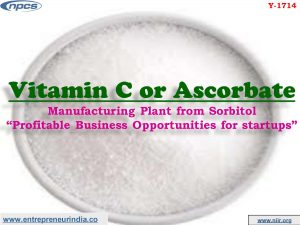Vitamin C or Ascorbate Manufacturing Plant from Sorbitol. Profitable Business Opportunities for startups.

Introduction
Vitamin C, also known as ascorbic acid, is a necessary nutrient for the body to function properly. It's found in foods and nutritional supplements, and it helps with a variety of biological functions, including collagen production, wound healing, and cartilage, bone, and tooth repair and maintenance. Vitamin C is an antioxidant, which means it can neutralize free radicals that cause genetic damage to cells. Ascorbic acid is a water-soluble vitamin that is present in nature (Vitamin C). Ascorbic acid is a powerful reducing and antioxidant that aids in the fight against bacterial infections, detoxification, and collagen formation in fibrous tissue, teeth, bones, connective tissue, skin, and capillaries. Vitamin C is found in citrus fruits and vegetables and cannot be produced or stored by humans, so it must be obtained via the diet.
Related Projects:- Projects Reports And Profiles
Uses of Vitamin C (Ascorbic Acid)
Colds, asthma, bronchitis, cancer, chronic pain, cataracts, gastritis, glaucoma, heart disease, high blood pressure, osteoarthritis, and Parkinson's disease are among the diseases that vitamin C is thought to help cure or avoid.
It is now commonly promoted as a natural cure to the common cold. Despite its popularity as an "immune booster," there is no evidence that taking vitamin C will actually prevent or treat infection. Vitamin C is required for tissue growth and repair in the body.
It is used in the following situations:
· Bone, tendons, ligaments, and blood vessels are all made up of this essential protein.
· Wounds are healed and scar tissue is created.
· Maintain cartilage, bones, and teeth by repairing and maintaining them.
· Assist with iron absorption
Related Books:- Pharmaceutical, Drugs, Proteins Technology Handbooks
Manufacturing Process of Vitamin C (Ascorbic acid)
The Reichstein method, two-step fermentation with a single culture, and two-step fermentation with a mixed culture are the three available process technologies for producing ascorbic acid. These process technologies have a 60 percent total yield of output in general. The two-step fermentation, on the other hand, is more efficient and produces higher-quality products than the Reichstein method.
The Reichstein method and two-step fermentation have atom economy values of 0.6424 and 0.5383, respectively, in terms of process technologies economy. Atom economy refers to a chemical process' conversion efficiency in terms of all atoms involved and the desired products generated. The two-step fermentation method's lower capital and operational costs outweigh its lower atom economy; as a result, the two-step fermentation process' total revenue is higher than the Reichstein process.
Related Videos:- Pharmaceutical, Drugs, Fine Chemicals, Bulk Drug Intermediates, Pharmaceutical Drugs, Pharma Drug Ingredients Intermediates, Pharmaceutical Bulk Drugs
Market Outlook
The strong application spectrum in the cosmetics, pharmaceutical, animal feed, and processed food industries is driving the market size of vitamin C. It's primarily found in fruits and vegetables, and it's also taken as a dietary supplement. It's used to avoid heart failure, vision disorders, immune system defects, skin wrinkling, and prenatal health problems. By 2024, the global vitamin market could be worth more than USD 10 billion. Vitamin C is a natural antioxidant that protects cells from free radical damage when they are exposed to radiation or UV rays. It is involved in protein metabolism and is needed for collagen biosynthesis. During the period 2020-2025, the ascorbic acid market is expected to develop at a CAGR of 5.1 percent.
Books: - BOOKS & DATABASES
Indian Govt Initiative for Vitamin C Production
In the wake of domestic producers arguing for the implementation of a levy, India has launched an anti-dumping inquiry into vitamin C imports from China. The move comes days after the Directorate General of Trade Remedies (DGTR) of the Commerce Ministry placed a six-month provisional anti-dumping duty on anti-bacterial medication Ciprofloxacin Hydrochloride imports from China. The investigation has been launched after Bajaj Healthcare said that ‘dumped imports' of vitamin C from China are harming the domestic industry.
Market Research; - Market Research Report
“In terms of important product characteristics such as physical and chemical characteristics, manufacturing process and technology, functions and uses, product requirements, pricing, and distribution, subject products manufactured by domestic industry and PUC (product under consideration) imported from subject country (China) are comparable. The products' marketing and tariff classification,” the company had said.
Key Players:-
· Dishman Pharmaceuticals & Chemicals Ltd.
· Glaxosmithkline Pharmaceuticals Ltd.
· Gulshan Polyols Ltd.
· Kasyap Sweetners Ltd.
· M S Healthcare Pvt. Ltd.
· Pfizer Healthcare India Pvt. Ltd.
· Pfizer Ltd.
For More Details:- https://www.entrepreneurindia.co/project-and-profile-details/Production%20of%20Vitamin%20C%20(Ascorbic%20Acid)
#DetailedProjectReport #businessconsultant #BusinessPlan #feasibilityReport #NPCS #entrepreneurindia #startupbusiness #ProjectReport #startup #projectconsultancy #businessopportunity #VitaminCIndustry #VitaminCMarket #AscorbicAcid #AscorbicAcidMarket #VitaminManufacturing #VitaminProduction #PharmaceuticalIndustry #PharmaceuticalMarket
|